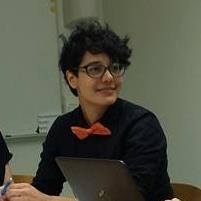I am a postdoctoral researcher at the Gender Studies Unit, University of Turku, Finland. I earned my PhD in 2016 from Linköping University, Unit of Gender Studies, and I hold a Master’s degree in Science, Technology and Society (STS) from the same university. I am very interested in interdisciplinary research that is inspired by feminist technoscience studies, environmental humanities, gender studies, health and medicine, and disability studies, to name just a few. I am also very enthusiastic about doing ethnography and field work for conducting my research.

My current postdoc research is a continuation of my doctoral dissertation, Making Death Matter. It is theoretically grounded in new materialism, feminist posthumanities and queer theories, and draws on the same ethnographic material that I collected for my dissertation in an Alzheimer’s sciences laboratory. I investigate how heteronormative and humanistic ideologies about “purity” and “pure Nature” shape the space of the laboratory and regulate waste management practices. How the materiality of the living and dead matter problematizes such fantasies of purity and prescribed categories of laboratory waste. How fruit flies’ bodies, living and nonliving, cross the boundaries between inside and outside, natural and unnatural/artificial, safe and hazardous waste, and life and death, creating queer ecologies of death.
I am also starting a new project about environmental allergies and pollution. I wish to address “pollution” as both the materiality of pollution and polluting matter, and as a metaphor emergent in relation to social injustices and discrimination that affect social vulnerabilities, e.g. gender and disability. How do patients as well as doctors and nurses create meaning about allergy? And how, in these moments of meaning-making, are the notions about humans, nature, the environment and illness created? I approach allergies as a mixed phenomenon taking place in relation to environmental changes, medical practices, sociocultural norms on healthy bodies, and personal experiences of living with allergies. Particularly, in a context in which not all bodies or all environmental illnesses are taken seriously. While some allergies with life-threatening symptoms, such as anaphylaxis, are associated with morbidity and therefore taken seriously, the nature of most common allergies is more manifested as an “invisible disability” (Honeyman 2016). The study aims to investigate the role of sociocultural understandings of dis/ability in the aforementioned processes and reconstruction of disabilities as the byproduct of everyday practices of living with, managing, and treating environmental allergies. It also aims to investigates the possibilities for living and surviving in an ethical and sustainable way in an environment that is polluted materially and socially.
Affiliations, Memberships and Networks:
Postdoctoral fellow at the Unit of Gender Studies, University of Turku
Adjunct at Centre for Gender Studies, Karlstad University
Member of The Posthumanities Hub
Co-chair of the Research Strand “Death Studies – Queerfeminist Materialist Perspectives” at GEXcel International Collegium
Member of the International Queer Death Studies Network
Member of COST Action IS1307 New Materialism: Networking European Scholarship on How Matter Comes to Matter
Member of NeuroGendering, NeuroCultures network
Publications over the past five years (2013-2018):
Radomska, Marietta, Tara Mehrabi and Nina Lykke (eds.), Women, Gender & Research, special issue: ‘Queer Death Studies: Coming to Terms with Death with Death, Dying and Mourning Differently’ (forthcoming 2019).
Mehrabi, Tara (forthcoming). Being intimate with the flies: On affective methodologies and laboratory work. Special issue Feminist STS at Work (eds.) Stine Willum Adrian, Nete Schwennesen & Lea Skewes. Women, Gender and Research Journal.
Mehrabi, Tara (Forthcoming), “Affective Methods”. New Materialism Almanac. (eds.) David Gauthier, Dortota Golanska, and Sam Skinner. Published online: New Materialism: Networking European Scholarship on ‘How Matter Comes to Matter’.
Mehrabi, Tara and Cecilia Åsberg (2018). “Model Territories: Choreographies of Laboratory Flies.” In Animal Places. Lively Cartographies of Human Animal Relations, (eds.) by Jacob Bull, Tora Holmberg and Cecilia Åsberg. pp. 162-181. New York: Routledge.
Mehrabi, Tara (2017). “Alzheimer’s in the making: A feminist laboratory study of Alzheimer’s disease.” In Gendering Drugs: feminist studies of pharmaceuticals, (ed.) by Ericka Johnson. pp. 15-37. New York: Palgrave Macmillan.
Mehrabi, Tara (2016). “Matters of Donation and Preserved Relations: Co-Construction of Egg Donation and Family Structures in Iran.” In Assisted Reproduction Across BordersFeminist Perspectives on Normalizations, Disruptions and Transmissions, (eds.) by Merete Lie and Nina Lykke. pp. 189-203. New York: Routledge.
Åsberg Cecilia and Tara Mehrabi (2016). “Nature in the lab”. In Macmillan Interdisciplinary Handbooks: Gender: Nature, (ed.) by Iris van der Tuin and Renee C. Hoogland. pp. 267-282, New York: Palgrave Macmillan.
Mehrabi, Tara (2016). Making Death Matter. A Feminist Technoscience Study of Alzheimer’s Sciences in the Laboratory. Doctoral thesis Linköping University Electronic Press: Linköping.
Hinton, Peta, Tara Mehrabi and Josef Barla (2015). Position paper on “New materialisms/New colonialisms.” For COST Action IS1307 New Materialism: Networking European Scholarship on ‘How Matter Comes to Matter’. Published online